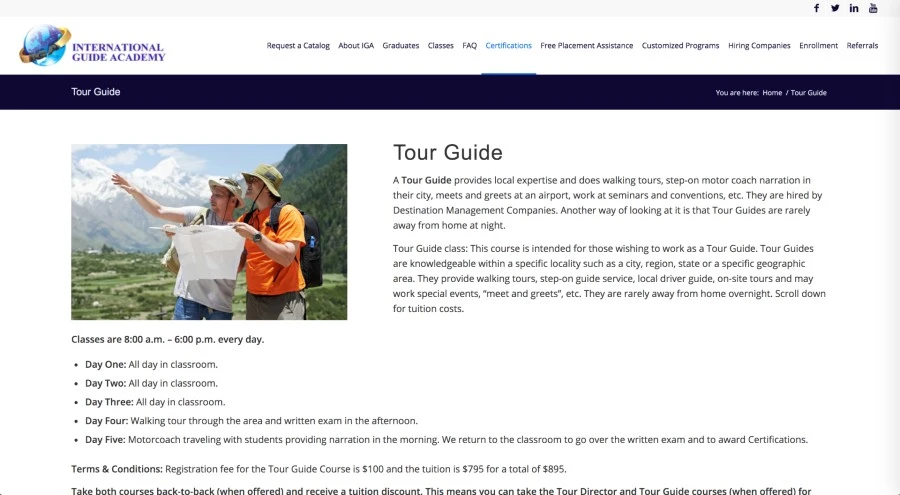Becoming a certified tour guide can significantly enhance your career in the travel industry. Tour guide certification not only validates your expertise but also boosts your credibility and professionalism.
In this article, we will explore the importance of tour guide certification, the process involved, and the benefits it offers to both tour guides and travelers. Get ready to discover how certification can take your tour guiding skills to new heights and open doors to exciting opportunities.
What is Tour Guide Certification?
Definition and purpose of tour guide certification:
Tour guide certification is a formal recognition of a tour guide’s competence and expertise in providing professional guiding services. It signifies that a tour guide has met specific standards and possesses the necessary knowledge and skills to deliver exceptional experiences to travelers.
Types of certifications available:
When it comes to tour guide certifications, there are various types available, catering to different destinations and specializations within the travel industry. Here are some common types of certifications:
- National or Regional Certifications: These certifications are issued by national or regional tourism authorities and focus on specific countries or regions. Examples include the Blue Badge Guide certification in the United Kingdom or the Certified Tour Guide designation by the National Institute of Tourism Promotion in a specific country.
- Cultural and Historical Certifications: These certifications specialize in cultural and historical destinations, providing in-depth knowledge of specific sites and landmarks. For example, the International Council on Monuments and Sites (ICOMOS) offers certifications for heritage interpretation and conservation.
- Adventure and Outdoor Certifications: For guides specializing in adventure tourism or outdoor activities, certifications such as Wilderness First Aid or Leave No Trace Trainer Certification can be valuable. These certifications demonstrate expertise in safety, wilderness skills, and sustainable practices.
- Sustainable Tourism Certifications: As sustainability becomes increasingly important in the travel industry, certifications such as the Global Sustainable Tourism Council (GSTC) certification or the Travelife certification showcase a guide’s commitment to responsible and eco-friendly tourism practices.
- Specialized Tour Certifications: These certifications focus on specific types of tours, such as culinary tours, wine tours, or wildlife tours. They equip guides with specialized knowledge and skills required to deliver exceptional experiences in those areas.
- Language and Cultural Interpretation Certifications: For multilingual guides or guides operating in multicultural settings, language and cultural interpretation certifications can be valuable. These certifications ensure proficiency in multiple languages and understanding of cross-cultural communication.
- Professional Association Certifications: Many professional associations, such as the International Tour Management Institute (ITMI) or the Professional Tour Guide Associations in different countries, offer certifications specific to their organization. These certifications demonstrate adherence to professional standards and a commitment to ongoing education and development.
Benefits of Tour Guide Certification
Enhanced knowledge and skills:
Certification programs provide tour guides with comprehensive training, covering various aspects of guiding, including destination knowledge, storytelling techniques, group management, and safety protocols. This training equips guides with the knowledge and skills needed to deliver informative and engaging tours.
Increased credibility and professionalism:
Tour guide certification enhances your professional standing by demonstrating your commitment to the highest industry standards. It instills confidence in travelers, as they know they are in the hands of a knowledgeable and trustworthy guide. Certification sets you apart from non-certified guides and increases your chances of securing employment with reputable tour operators.
What Does Tour Guide Certification Entail?
Educational requirements and training programs:
Tour guide certification typically involves completing a structured educational program that covers a range of topics relevant to tour guiding. These programs may be offered by accredited organizations, colleges, or vocational schools, and can vary in duration and curriculum.
Examinations and practical assessments:
Certification programs often include written examinations to evaluate a guide’s understanding of the course material. Additionally, practical assessments may be conducted to assess guiding skills, such as leading mock tours or demonstrating effective communication with guests.
Where to Obtain Tour Guide Certification
Accredited organizations and institutions:
When seeking tour guide certification, it’s crucial to obtain it from accredited organizations or institutions recognized within the travel industry. Here are some reputable entities that offer accredited tour guide certifications:
- World Federation of Tourist Guide Associations (WFTGA): The WFTGA is a globally recognized federation that promotes and supports the profession of tour guiding. They provide certification programs through their member associations in different countries, ensuring high-quality standards and professional development for tour guides worldwide.
- International Guide Academy (IGA): The International Guide Academy offers comprehensive training and certification programs for aspiring tour guides. They provide both on-site and online courses, covering a wide range of topics such as guiding techniques, destination knowledge, and customer service skills.
- Institute of Tourist Guiding (ITG): The Institute of Tourist Guiding is a leading professional body in the United Kingdom. They offer accredited certifications, including the Blue Badge Guide and Green Badge Guide certifications, which are highly respected and recognized qualifications for tour guides in the UK.
- Professional Tour Guide Associations: Many countries have professional tour guide associations that offer certifications. Examples include the National Tour Association (NTA) in the United States, the Japan Guide Association (JGA), and the Professional Tourist Guides Association of South Africa (PTGSA). These associations set standards and provide training and certification programs specific to their regions.
- Local Tourism Boards and Authorities: Local tourism boards and authorities in different countries often offer certifications for tour guides operating within their regions. These certifications ensure guides meet specific standards and possess the necessary knowledge to deliver high-quality tours. Examples include the Hong Kong Tourism Board (HKTB) or Tourism New Zealand’s Qualmark certification.
- Vocational Schools and Universities: Some vocational schools and universities offer tour guide certification programs as part of their travel and tourism curriculum. These programs provide comprehensive training and may offer diplomas or certificates upon completion. Examples include the Tourism and Travel Management programs at reputable institutions worldwide.
Online certification programs:
Online certification programs provide a convenient and flexible way to obtain tour guide certification from anywhere in the world. Here are some reputable online platforms that offer tour guide certification programs:
- Udemy: Udemy is a popular online learning platform that offers a variety of tour guide certification courses. These courses cover a wide range of topics, including destination knowledge, guiding techniques, storytelling, and customer service. Udemy courses are self-paced, allowing you to learn at your own convenience.
- Coursera: Coursera collaborates with leading universities and institutions to provide online certification programs, including those related to tour guiding. Their courses are designed by industry professionals and cover various aspects of tour guiding, such as cultural heritage interpretation, sustainable tourism, and destination management.
- Global Travel Academy: The Global Travel Academy offers an online tour guide certification program that covers essential skills and knowledge needed for professional guiding. Their comprehensive course includes modules on guiding techniques, customer service, safety protocols, and destination-specific information. The program provides the flexibility to study at your own pace.
- International Tour Management Institute (ITMI): ITMI offers an online tour director certification program for individuals interested in leading group tours. Their comprehensive curriculum covers topics such as itinerary planning, logistics management, group dynamics, and storytelling. The program includes online training modules, assignments, and practical assessments.
- iGottaGuide: iGottaGuide is an online platform that offers a self-paced certification program for tour guides. The program includes interactive modules on topics such as communication skills, guiding techniques, and destination knowledge. Upon successful completion, you receive a certification recognized by the iGottaGuide network.
- American Tour Guide Association (ATGA): ATGA offers an online tour guide certification program for individuals seeking to become professional guides in the United States. The program covers essential skills, legal requirements, and best practices for guiding in various regions of the country. The certification is recognized within the US tourism industry.
When choosing an online certification program, ensure that the provider is reputable, offers comprehensive curriculum content, and provides support and resources for your learning journey. Consider reading reviews, checking the course syllabus, and verifying the credibility of the certification upon completion.
Importance of Continuous Learning and Professional Development
Staying updated with industry trends and regulations:
The travel industry is constantly evolving, with new trends, regulations, and destinations emerging. As a certified tour guide, it is essential to stay informed and up-to-date with industry developments to provide the best possible experiences for your guests.
Engaging in additional training and specialized certifications:
To further enhance your skills and expand your knowledge, consider pursuing additional training and specialized certifications. These opportunities allow you to specialize in specific areas, such as sustainable tourism, cultural heritage, or adventure guiding, enabling you to offer unique and sought-after experiences.
Frequently Asked Questions
A. Is tour guide certification necessary to work as a tour guide?
While certification may not be mandatory in all destinations, it is highly recommended to pursue tour guide certification. Certification enhances your professionalism, provides a competitive edge, and gives you the knowledge and skills to deliver exceptional tour experiences.
B. How long does it take to get certified as a tour guide?
The duration of tour guide certification programs can vary, depending on the depth of the curriculum and the flexibility of the program. Programs can range from a few weeks to several months, depending on the intensity of study and practical training involved.
C. Are there different certifications for specific regions or types of tours?
Yes, there are certifications available that focus on specific regions or types of tours. These specialized certifications allow you to delve deeper into the unique aspects and requirements of particular destinations or niche markets within the travel industry.
Conclusion:
Tour guide certification offers numerous benefits for both tour guides and travelers alike. It provides enhanced knowledge and skills, increases credibility and professionalism, and opens doors to exciting career opportunities. By pursuing certification and engaging in continuous learning, you can become a top-tier tour guide, delivering memorable and enriching experiences to travelers from around the world.
Fun Fact: Did you know that the world’s oldest known tour guide certification program was established in 1950 in Switzerland? It aimed to ensure that tour guides met certain standards and provided high-quality guiding services. Since then, tour guide certification has become a global practice, with certifications offered in various countries across the globe.





1 thought on “Tour Guide Certification: Knowledge and Trust”